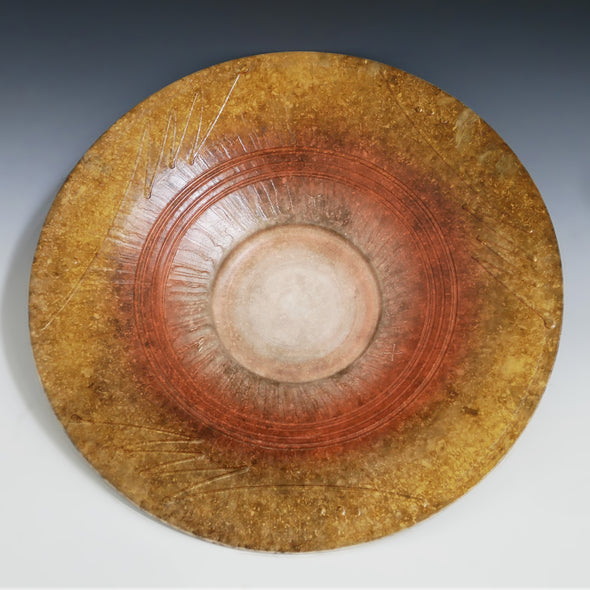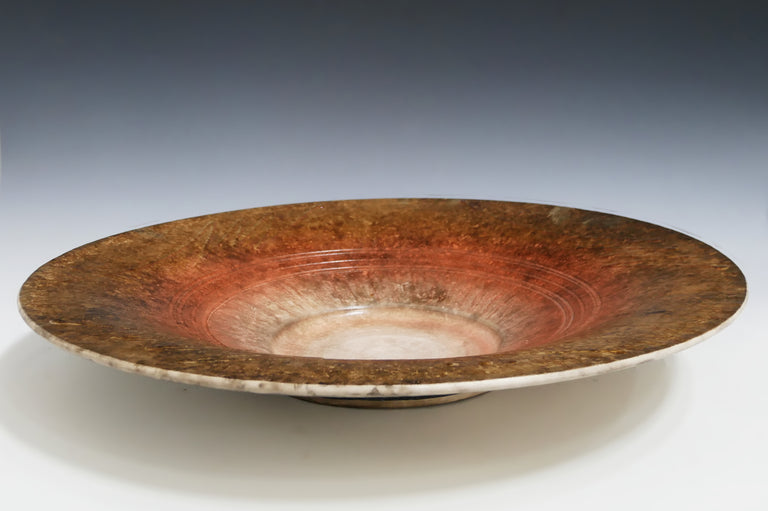Lee Hazelgrove
Large Platter
Wheel Thrown Stoneware
25"dia 4"tall
$320
For Lee Hazelgrove, art is best broken down into two parts, not necessarily equal in nature: process and the tangible object. Paramount to him is process. The act of creating. The doing. It represents activity, thought, creative impulse, the channeling of product. Hazelgrove’s playground lies somewhere between the two, inside the space where process and product meet, where all the most delicate and perfect parts of the process merge into art.
His influences clearly comes through in his work, yet Hazelgrove’s work has an undeniable voice of its own. His pieces are keepers of time, holders of spirits, vessels of wisdom, all imbued with a quiet fortitude that could come from no other source than from their maker. His work reflects his deep understanding of the human experience, of intense suffering and limitless joy, and ultimately of one’s inevitable compulsion to evolve into a newer form of oneself.“Each day brings a new complication when working with this primitive medium, and I have come to realize there must be a part of my personality that requires such demands and challenges,” said Hazelgrove. “In the end, the obstacles and pitfalls of process are necessary. They provide a constant source of humility.”
Standing amid his work, one immediately senses this intentional channeling of energy. His colors are bold and vibrant, yet the lines of his vessels are soft and subtle. The sheer size and weight of some of his work carries with it a tangible power, while the brush strokes suggest an elegance that is pure and unburdened. And his unquenchable thirst to challenge himself in the creative process is what propels him. “Much of this challenge has been purely physical,” said Hazelgrove. “I enjoy working on a very large scale, pushing myself to master bigger vessels,” he said. “In spending several hours on a four-foot-tall urn, or a three-foot-wide platter, there is a greater sense of focus, communion with the clay, solitude of the studio, and greater degree of commitment to each piece and its outcome.” The challenge continues as these creations face the fire and the never-ending demands of the kiln.
The primitive firing methods seen in indigenous cultures permeate his work: the smoke, reduced surface found in Indian burial mounds, Central American modern day pots, and African tribal pottery. Contemporary influences are evident in his forms and surfaces: artists like Shoji Hamada, Robin Hopper, Jun Kneko, Don Reitz, Tom Coleman, Phil Chapman, Patrick Horsley, Don Sprague, and the glass vessels by Mary Van Cline.
What’s even more evident in his work is an ever-present tension that, according to Hazelgrove, is a vital and necessary part of successful art. “In its simplest breakdown, my work is both contemporary and ancient, quiet and commanding, subtle but large in scale,” said Hazelgrove. “These are the aspects of art and clay that I attempt to balance…finding that sweet spot where the opposing dualities perfectly complement each other.”
Hazelgrove’s work stems from a deep spiritual center that he discovered early in his adult life. Around 1984, while apprenticing for Richmond potter Robin Cage, he was introduced to master potter and spiritual force, Mary Bowerman. “At 70 years plus, she threw wood fired pots that were so simple, understated and subtle,” said Hazelgrove. “They were almost capable of being written off as pedestrian until one held a small cup or plate and felt its primal impulse. It was staggering to me.” In the early 90’s, he came across the work of Yih-Wen Kuo at Richmond’s Hand Workshop (now Visual Arts Center). “One piece in particular completely overwhelmed me,” said Hazelgrove,” “I must have gone back to the gallery at least a half a dozen times that month just to sit with it and feel the vibration of the vessel,” he said.
His influences clearly comes through in his work, yet Hazelgrove’s work has an undeniable voice of its own. His pieces are keepers of time, holders of spirits, vessels of wisdom, all imbued with a quiet fortitude that could come from no other source than from their maker. His work reflects his deep understanding of the human experience, of intense suffering and limitless joy, and ultimately of one’s inevitable compulsion to evolve into a newer form of oneself.“Each day brings a new complication when working with this primitive medium, and I have come to realize there must be a part of my personality that requires such demands and challenges,” said Hazelgrove. “In the end, the obstacles and pitfalls of process are necessary. They provide a constant source of humility.”



